Publications
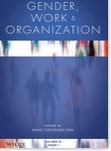
Touch mediates relations between self-other, writers, and readers; it is material and affective. This paper is the outcome of writing touch as a collaborative activity between eight women writers across different times and locals. In sharing experiences of touch during and beyond the pandemic, we engage with collaborative writing articulated here as colligere, involving the assembling of writing in a holding space. The meanings and feelings of touch arise from our distinct writer positionalities as we think, work, and write in and about life, research, organizations, and organizing. We suggest that writing that reflects on/through touch presents epistemic vulnerability and openness to unknowing in the nexus of intercorporeal relationships. Writing touch contributes to writing and doing academia differently, particularly by offering sensorial encounters that reframe the ethico-political conditions of academic knowledge creation.
Link to article: https://onlinelibrary.wiley.com/doi/full/10.1111/gwao.13064

Our academic field of leadership studies is plagued by an unscholarly
obsession with fashions and clientelism. We have a pronounced pen-
chant to tell our audiences what they like to hear and what makes us
popular rather than what they need to know. Moreover, much of our
work suffers from a chronic illusion that the study of leadership per-
tains to natural sciences and is governed by what to us at least appear
to be highly elusive laws of causality. These two afflictions together
skew the study of the fuzzy social phenomenon we have come to
know as leadership, towards understandings of a world that many find
intellectually unappealing, ideologically loaded, and practically
misleading.
Despite our skepticism towards authentic leadership theory (see
Alvesson & Einola, 2019, 2022; Einola & Alvesson, 2021), we do think
that authenticity should be a topic of inquiry within the field of leader-
ship and organization studies. We want to encourage our colleagues
to be what the Enlightenment scholar and poet, Schiller, referred to as
philosophical minds (Alvesson et al., 2022a) and use imaginative and
novel approaches to conduct research in this area. In this article, we
seek to both address some broader questions of what we suggest
leadership studies is about—or rather could be about, and to engage
directly with Helmuth, Cole and Vendette's article on authentic action
(Helmuth et al., 2023).
Link to article: https://helda.helsinki.fi/server/api/core/bitstreams/7a8e1a6a-e885-4fd6-b732-712874f45108/content
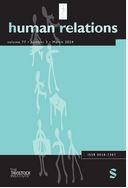
We offer a critical inquiry into the faltering entry of an anthropomorphised AI (ro)bot, an algorithm without physical or visual form, into the workplace in a media consultancy company. While living a digital life in the virtual world, the ro(bot) was given a human name. We highlight the unexpected consequences the humanisation of an early form of artificial intelligence (AI) has on the affects circulating between people and the new technology and between members of different organisational groups. We argue that anthropomorphising technologies such as AI influences the affective life of organisations and amplifies existing discontent between organisational members, complicating the introduction of the technology. Focusing on human–AI interaction, our analysis reveals a rift between managers who are excited and hopeful about the future capabilities of AI and employees who are frustrated and angry about its present shortcomings. We conclude that collective affects play a central role in contemporary technology-driven organisations in which the role people play in relation to the avalanche of AI technologies is often neglected.
Link to article: https://journals.sagepub.com/doi/full/10.1177/00187267231206328
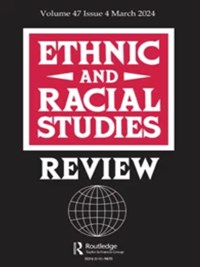
In this article, we challenge the prevailing assumption about the impact of higher education on attitudes toward racial and ethnic minorities by examining whether educational effects are monolithic or manifold instead. Using data from the General Social Survey (1972–2021), we use a variety of measures of education (years, levels, sectors, and majors) to unpack the relationship between higher education and intergroup attitudes, specifically anti-immigration attitudes among native-born Americans and anti-Black attitudes among non-African Americans. Results show that some higher education graduates hold out-group attitudes that are not much different from those without any higher education. Narrowing our focus to respondents only with higher education, we find significant variation in out-group attitudes across educational sectors and academic majors. These results have implications for how we understand previous scholarship on prejudice and higher education, which may have overestimated the impact higher education has, in general, on prejudice.
Link to article: https://doi.org/10.1080/01419870.2023.2295479
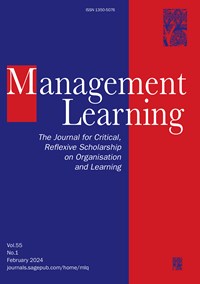
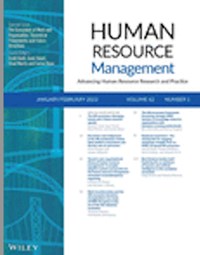
Artificial intelligence (AI) has become an important topic in business literature and strategy talk. Yet, much of this literature is normative and conceptual in nature. How organizational members perceive AI and the job role changes that come with it is, so far, largely unknown territory for both HR scholars and practitioners. We sought to investigate the relationship between humans and AI and conducted an in-depth exploratory study into the co-existence of humans and two early-stage AI-solutions, one for “low-status” automation and another for “high-status”; augmentation. We suggest that different organizational groups may engage in distinctly different sensemaking processes regarding AI, an important insight for successful HRM strategies when AI is being introduced into the workplace. Moreover, contrary to recent conceptual work, our findings indicate that AI-enabled automation and augmentation solutions may not be detached from nor exist in tension with each other. They are deeply embedded in organizational processes and workflows for which people who co-exist with the technologies must take ownership. Our findings, in part, go against discussions on AI “taking over” jobs or deskilling humans. We describe a more nuanced version of reality fluctuating around the various ways different organizational groups encounter different AI-solutions in their daily work. Finally, our study warns against unconditional technological enthusiasm, managerial ignorance of the nature of work that employees undertake in different organizational groups, and a neglect of the time and effort required to successfully implement AI-solutions that affect not only the home organization but also members of the broader ecosystem.
Learn more: https://onlinelibrary.wiley.com/doi/full/10.1002/hrm.22147
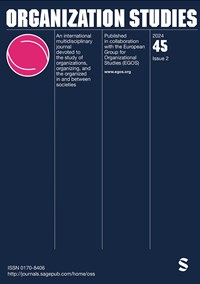
In this essay, we discuss basic orientations and ways of being among us, the academics, especially in the context of research. Using German poet, scholar and author Friedrich Schiller’s distinction between ‘der philosophische Kopf’ (‘philosophical mind’) and ‘Brotgelehrte’ (‘bread-fed scholar’), we contrast ideal-typical figures in academia. We find these forgotten 18th-century characters inspirational to help us understand some troublesome contemporary developments of academics and academia and to remind us of the perhaps perennial nature of the ongoing controversies and debates. We further develop and nuance these figures and bring them to the 21st century. Like Schiller in his time, we want to highlight the importance of each of us in shaping what academia is and what it becomes. The contrast may help us think through who we are, what is driving us in our work, and how we can (re)construct ourselves in the light of dominant normalizations and templates for being in contemporary academia.
Learn more: https://journals.sagepub.com/doi/full/10.1177/0170840621989002
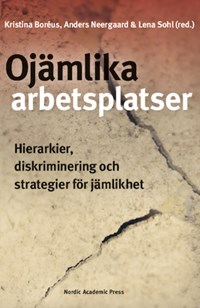
Denna antologi handlar om det ojämlika arbetslivet i ett Sverige präglat av ökad ojämlikhet. Rasifierad ojämlikhet, rasism och diskriminering på enskilda arbetsplatser är i fokus, men även klass- och könsmässig ojämlikhet studeras. Ojämlikhetsregim är ett begrepp som används för att analysera arbetsorganisationer i flera av bidragen. De studerade arbetsplatserna återfinns i olika sektorer, inte minst inom vården. Boken innehåller även bidrag som ger jämförande internationella perspektiv och som studerar ojämlikhetens utveckling över tid. Antologin innehåller 12 kapitel som redovisar empiriska studier av arbetslivet, ett kapitel som analyserar politikteoretiska frågor om ojämlikhet, ett inledande och ett avslutande kapitel som ramar in och drar slutsatser från studierna, samt ett efterord. Författare är 22 forskare från olika samhällsvetenskapliga discipliner.
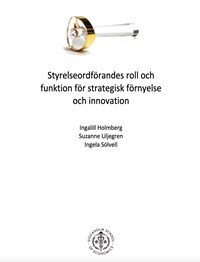
Swedish business need companies that can create profitability, renewal and sustainable business in global competition. In recent years, these eligibility requirements have been combined with expectations of transparency, responsibility and the ability to transform digitalization into a competitive advantage. With the increased competitive pressure, the role of the Board has become an issue of vital importance.
A review of Swedish and international business magazines shows that the work of the Board is undergoing a major change and that expectations regarding external monitoring and strategic renewal are paired with requirements on skills development and the revitalization of working methods. The prime focus of this study is on the role of the Chairperson for firm performance and value creation. The empirical data covers the unique material of the award the Golden Gavel, instituted by Stiftelsen Guldklubban in 2005.
Collaborating partners: Styrelseakademien, Sverige and Stiftelsen Guldklubban. The project is funded by VINNOVA. Project leader: Professor Ingalill Holmberg
Publication:
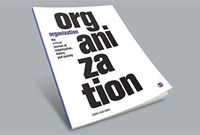
Women village leaders and equality
Women village leaders in Tamil Nadu (India): how their position of token can explain limited progress in gender equality. Taran Patel, Laurence Romani, Poonam Oberoi and Chandra Ramasamy in the journal Organization
Why has the gender-based reservation system not succeeded in achieving gender equality in Indian politics? Both token theory and critical mass theory posit that equilibrating number of representatives from both genders will achieve gender equality. In India, this led to the reservation system for women in politics in 1993 and an increase in women representation, in some Indian states up to 50%. Yet, we argue, these women face role encapsulation in their double minority position. Inspired by interpretivist ethnographic methods, this study investigates everyday work of women politicians (village council presidents) in Tamil Nadu. We show that in their work context, women politicians are in token positions and this contributes to understanding the modest results met with the reservation system. Simultaneously, the study points to how women use their role encapsulation within the traditional family structure to serve their political ambitions despite patriarchy. We draw attention to individual resistance, more precisely, insubordination and everyday resistance, to stress how some of these women politician are challenging patriarchy. This contributes to enriching our understanding of the forms of assimilation in token theory: for a token who experiences a double deviance, role entrapment is not as limiting as previous studies have assumed. We also argue that everyday acts of resistance can be carried out precisely through the enactment of role encapsulation and that some women reach change through this subject position, rather than in opposition to it.
Learn more: https://journals.sagepub.com/doi/10.1177/1350508421995764
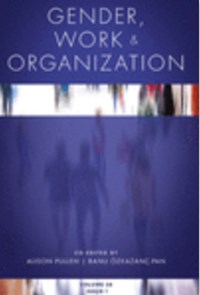
In this editorial, we plea for radicalizing diversity research by re-engaging with the notion of class. We argue that theories of class, which are today seldom used in critical diversity research, have the potential to conceptualize the relationship between difference and power in ways that go beyond the current focus on equality within capitalist organizations. Theories of class radicalize diversity research by providing a conceptual vocabulary to ground the critique of diversity in the critique of capitalism. To highlight this potential, we first reconstruct the ideological historical context of the 1980s in which diversity research emerged, re-embedding it in a broader political project to restructure the economy, work and society as a whole. We then present four main uses of the concept of class in management and organization studies and the theoretical traditions that underpin them. We go on to introduce the four contributions to this Special Section, illustrating how class, variously understood, can inform critical understandings of diversity. We conclude by leveraging class within four strategies for more radical diversity scholarship: classing workers, occupations, and workplaces; classing diversity; classing meritocracy; and classing struggles for social justice.
Learn more: https://onlinelibrary.wiley.com/doi/full/10.1111/gwao.12593
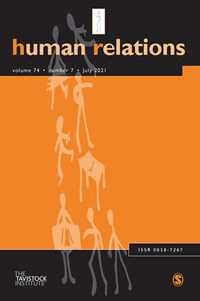
Why do highly skilled migrants encounter difficulties getting a skilled job? In this study, instead of searching for an answer in migrants’ characteristics, we turn to organizations and ask: why do organizations underemploy highly skilled migrants? With an in-depth qualitative study of a programme for highly skilled migrants’ labour integration in Sweden, we show that highly skilled migrants are perceived as a potential threat to organizational norms and practices. Using the relational theory of risk – approaching risk as socially constructed – the study provides a novel explanation for highly skilled migrants’ underemployment. It shows an organization logic protecting corporate practices seen as ‘normal’ from a perceived disruption that employing highly skilled migrants could possibly cause. Theoretical contributions to the understanding of highly skilled migrants’ employability are threefold: (1) the field assumption that organizations are in favour of hiring migrants is challenged; (2) highly skilled migrants’ underemployment is explained through a protective organizational logic; and (3) we stress the necessity to problematize an implicit reference to organizational normality when recruiting.
Learn more: https://journals.sagepub.com/doi/10.1177/0018726721992854
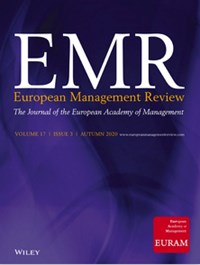
Extant research on tokenism has documented the adverse consequences for employees in minority positions and how women's possibility of action is constrained in male-dominated contexts. We present an in-depth qualitative case study of a male-dominated organization in a masculine industry in which, despite all expectations, the experience of tokenism for minority women is ambiguous. Furthermore, these women also display a strong agentic role in an organization in which culture favours gender equality. This case reveals an aspect previously overlooked in studies of tokenism: the importance of organizational culture. By exposing and challenging the implicit masculine norm through its organizational culture, this organization actively engages in the change of gendering processes and contributes to establishing an alternative norm. Theoretical contributions show the impact of normative control on the experience of tokens, and how it provides a frame for action toward gender equality.
Learn more: https://onlinelibrary.wiley.com/doi/full/10.1111/emre.12385
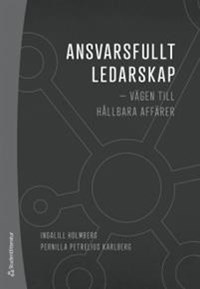
I den här boken ligger fokus på ansvarsfullt ledarskap samt de verktyg och metoder som används för att iscensätta innovation och förändring.
Det är samspelet mellan individens värderingar, företagets kultur, smarta innovationsdrivande processer och ett holistiskt perspektiv på hållbarhet som lägger grunden för innovationer och lärande.
Att utveckla hållbara affärer ställer stora krav på innovationsförmåga och ett ledarskap som går bortom finansiella nyckeltal och kortsiktiga ägarintressen. Vad innebär ett sådant ledarskap? Hur kan ansvarsfullt ledarskap göras till en drivkraft för innovation och hållbarhet? I den här boken beskrivs verktyg och modeller som har utvecklats i olika kontexter för att driva strategiska förändringar där innovation, hållbarhet och ökat ansvar är helt avgörande för organisationens överlevnad och framgång. Ett genomgående tema är de utmaningar och möjligheter som följer av att verka i en global värld med hög förändringstakt.

This book is a collection of 16 empirical cases in critical Cross-Cultural Management (CCM). All cases approach culture in CCM beyond national cultures, and all examine power as an integrative part of any cross-cultural situation. The cases also consider diversity in the sense of culturally or historically learned categorizations of difference (such as gender, race, ethnicity, religion and class), and acknowledge how diversity categories might differ across cultures. Furthermore, each case suggests a specific method or concept for improving upon the situation. Out of this approach, novel insights emerge: we can see how culture, power and diversity categories are inseparable, and we can understand how exactly this is the case. The uses and benefits of this book are thus both conceptual and methodological; they emerge at the intersections of Critical CCM and diversity studies. All cases also discuss implications for practitioners and are suitable for teaching.
Mainstream CCM often limits itself to comparative models or cultural dimensions. This approach is widely critiqued for its simplicity but is equally used for the exact same reason. Often, academics teach this approach whilst cautioning students against implementing it, and this might be simply due to a lack of alternatives. Through means of rich empirical cases, this book offers such an alternative.
Considering the intersections of culture, diversity and power enables students, researchers and practitioners alike to see ‘more’ or ‘different’ things in the situation, and then come up with novel approaches and solutions that do justice to the realities of culture and diversity in today’s (and the future's) management and organizations. The chapters of this book thus offer concepts and methods to approach cross-cultural situations: the conceptual gain lies in bringing together CCM and (critical) diversity studies in an easily accessible manner. As a methodological contribution, the cases in this book offer the concise tools and methods for implementing an intersectional approach to culture.

In today’s increasingly global world, the management of differences is becoming a part of the activities of managers as well as global leaders. We argue that, despite leaders’ best intentions, the consideration of these differences and the way in which they are handled may be unethical. We advance that inclusive leadership could be a valid framework to address cultural diversity differences in an ethical way. This chapter is concerned with the concept and practice of inclusive leadership and its possible contribution to the management of cultural diversity in organizations. We first present the ethical challenges that organizations face when leading cultural differences. By examining the fundaments of what is commonly called ‘the business case’ for diversity, we underline its ethical limitations. We then underscore the ethical problems that are linked to the ways in which cultural differences are frequently seen and defined. Adopting a relational perspective on leadership, we introduce the concept of inclusive leadership. Building upon the existing literature on diversity and cross-cultural management, we proceed to propose a three-step model for inclusive leadership on an interpersonal level. Our ambition is to increase the awareness for global leaders of the ethical components of leading cultural diversity.
Learn more: https://www.e-elgar.com/shop/gbp/research-handbook-of-global-leadership-9781782545347.html
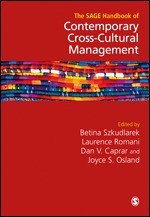
This handbook presents a comprehensive and contemporary compendium of the field of cross-cultural management (CCM). In recognition of current trends regarding migration, political ethnocentrisms and increasing nationalism, the chapters in this volume not only cover the traditional domains of CCM such as expatriation, global (virtual) teamwork and leadership, but also examine emerging topics such as bi/multi-culturalism, migration, religion and more, all considered from a global perspective.
The result is a Handbook that acknowledges and builds on a variety of research traditions (from mainstream to interpretivist to critical CCM), updates existing knowledge in relation to current challenges, and sets the direction for future research and developments.
Sample reviews:
The editors of The SAGE Handbook of Contemporary Cross-Cultural Management set themselves an ambitious goal “to provide a compass for CCM scholarship, practice, and policy and encourage the multi-level, multi-paradigmatic, and interdisciplinary reflective stance needed for a relevant, contemporary, CCM.” Amazingly, this volume, with contributions from key luminaries of the CCM field, does just that! A must have for any serious researcher in CCM, I give this book my highest recommendation. Kudos to all the authors and editors for this exemplary contribution to the field of CCM.
Nakiye A. Boyacigiller, Emerita Professor of International Management, Sabanci University and San Jose State University
This state-of-the-art collection pushes the theoretical, thematic and disciplinary frontiers of cross-cultural management. It combines rigorous insights with fresh interdisciplinary perspectives on emerging topics. This exciting intellectual journey is a vital prompt for more reflexive and pluralistic theorizing and empirical work in the field. The SAGE Handbook of Contemporary Cross-Cultural Management is a must-read for scholars from any discipline interested in cross-cultural dimensions of managing and organising in our diverse, fragile and complex world.
Gavin Jack, Professor of Management, Monash University

Cet article présente les apports des études critiques en gestion interculturelle (Cross-cultural management : CCM) pour penser les relations interculturelles dans les organisations. La CCM critique se concentre sur les rapports de pouvoir qui imprègnent les relations interculturelles et leur gestion en contexte organisationnel. Son ancrage dans la sociologie du changement radical et sa posture de recherche de dénaturalisation sont abordés ainsi que trois courants de recherche qui la caractérisent : les études interprétativistes critiques, les analyses bourdieusiennes et les études postcoloniales. Enfin, l’article évoque l’avenir de la CCM critique et son programme implicite : l’émancipation.
https://journals.openedition.org/communicationorganisation/9201
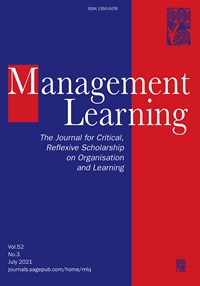
Taking a managerial position involves not only taking on managerial tasks and responsibilities but also developing an identity as manager. Recent work on manager learning thus proposes that identity work is a significant part of learning to become manager. This work has, however, rarely focused on first-time managers and, despite the emphasis on process, has rarely examined identity work over time. Against this background, we present a longitudinal study of six newly appointed managers. Adopting a Ricoeurian perspective, we construct “small stories” to explore how they made sense of themselves and how to relate to others in light of new experiences in their everyday lives as nascent managers. The study provides insight into the process through which they were learning to become managers. Specifically, it highlights how the manager’s identity work oscillated over time by pointing to the ongoing dialectic between continuity and change, progress and stand-still, knowing and not-knowing, and excitement and despair.
Learn more: https://journals.sagepub.com/doi/abs/10.1177/1350507618820711?journalCode=mlqb
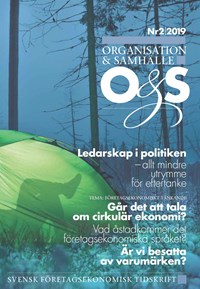
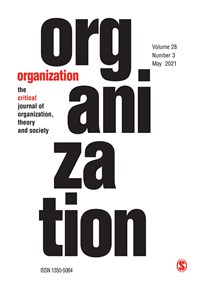
This article contributes to critical diversity management studies by exploring how human resources professionals do not see that the diversity measures they initiate can contribute to the reproduction of inequalities. We argue that framing such practices as benevolent obscures the fact that they are discriminatory acts. Drawing on the concept of benevolent discrimination, we conceptualise it along three dimensions: (1) a well-intended effort to address discrimination within (2) a social relationship that constructs the others as inferior and in need of help, which is granted with (3) the expectation that they will accommodate into the existing hierarchical order. Benevolent discrimination is a subtle and structural form of discrimination that is difficult to see for those performing it, because it frames their action as positive, in solidarity with the (inferior) other who is helped, and within a hierarchical order that is taken for granted. We develop the concept of benevolent discrimination building on an in-depth qualitative case study of a Swedish organisation that is believed to be exemplary in its engagement in diversity management initiatives. The organisation is however swayed by an inequality regime based on the intersection of class and ethnicity. We argue that it is precisely because human resources professionals frame their actions as acts of benevolence that they cannot see how they take part in organisational discrimination.
Learn more: https://journals.sagepub.com/doi/full/10.1177/1350508418812585

This case describes how responsible business was addressed at TeliaSonera, subsequently renamed Telia Company (Telia). The company was in crisis mode in 2012 and 2013 following media allegations of bribery in its activities in Uzbekistan. Telia appointed a new Board of Directors (hereafter, the Board) that elected a new Chair at the Annual General Meeting (AGM) in April 2013. A new Chief Executive Officer (CEO) joined the company in July 2013. There were ongoing internal investigations into Telia’s operations in Eurasia by the English law firm, Norton Rose Fulbright (NRF), that reportedto the Chair. The Chair and the CEO set a determined tone and communicated their intention to guide and fully support the transformation of the company into a responsible and sustainable business. In September 2013, the new Chief Ethics and Compliance Officer (CECO) joined the company and was instructed to create an Ethics and Compliance (E&C) function that had as its purpose the development of a framework for ethics and compliance programs and specifically the implementation of an effective anti-corruption program. At Telia, this work was referred to as Responsible Business.
Learn more: https://www.hhs.se/contentassets/9150381ae3a745bdb322f69b8e1c3491/telia-case-study-20181031-final-.pdf

This case providesan example of an investmentfirm with a vision to becomethe most reputable investor and ownerin the industry. The case shows how this vision is integrated with responsible business practices in the portfolio companies by taking a long-term,ownership mindset. By leveraging an active ownershipapproach, sustainability work becomes an integral part of enhancing businesses and makingapositive impact in societies where afirm has investments. To provide a deeper understanding of how the ownership mindset and practices interact with management in portfolio companies, the firm’s investment in the pest control company, Anticimex, is used as arole model example.
Learn more: https://www.hhs.se/contentassets/ee2dfba842c848678d9907c1b5941508/eqt-case-study-201810307ny-titlesida.pdf

This case describes Stora Enso ́s efforts to become a more sustainable and ethical company. The case focuses on the integration of both strategic decisions and practical work on sustainability issues into a global organization in which history is ever-present and the balance between centralized and local functions is key. Stora Enso ́s position as a global industry leader has been demonstrated by consistent work on environmental sustainability since the 1960 ́s. What makes this case particularly interesting is that Stora Enso has made steady progress on environmental sustainability while being challenged on issues of social responsibility and business ethics. The case covers a period of 50 years, but the main focus is on the years 2012-2017 when the company ran into trouble regarding responsible behavior and, in response, initiated a series of activities to strengthen internal practices and restore the reputation of the brand.

In the past few years, the quest for responsible and sustainable business has emerged as a major theme in academic and practical management discourse. The increasingly intense debate on ethical and social responsible business and the quest for responsible leadership put contemporary business models and current leadership praxis under severe public scrutiny. This paper is written within the framework of a research project that explores the linkages between responsible leadership, sustainable business, innovation, and growth in Swedish-based corporations with a global outreach. The case illustrates how an investment firm is implementing the vision to become the most reputable owner in the industry by leveraging active ownership. The research is based on collaborative case-study approach. The data-collection covers round-table seminars, interviews and documentary material.
Learn more: https://swoba.hhs.se/hastma/abs/hastma2018_002.htm

In the past few years, the quest for responsible and sustainable business has emerged as a major theme in academic and practical management discourse. The increasingly intense debate on ethical and social responsible business and the quest for responsible leadership put contemporary business models and current leadership praxis under severe public scrutiny. This paper is written within the framework of a research project that explores the linkages between responsible leadership, sustainable business, innovation, and growth in Swedish-based corporations with a global outreach. The paper captures how Stora Enso, a global renewable materials company, aspires to take the lead in developing sustainable business practices. Over the years, the company has demonstrated steady progress on environmental sustainability while business ethics globally continuously presents new challenges. In order to reinforce cultural values and restore the brand, the executive management team initiates a series of ground breaking activities. The research is based on collaborative case-study approach. The data-collection covers round-table seminars, interviews and documentary material.
Learn more: https://swoba.hhs.se/hastma/abs/hastma2018_001.htm
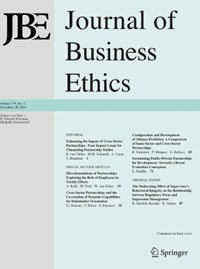
To commemorate 40 years since the founding of the Journal of Business Ethics, the editors in chief of the journal have invited the editors to provide commentaries on the future of business ethics. This essay comprises a selection of commentaries aimed at creating dialogue around the theme Ethics at the centre of global and local challenges. For much of the history of the Journal of Business Ethics, ethics was seen within the academy as a peripheral aspect of business. However, in recent years, the stakes have risen dramatically, with global and local worlds destabilized by financial crisis, climate change, internet technologies and artificial intelligence, and global health crises. The authors of these commentaries address these grand challenges by placing business ethics at their centre. What if all grand challenges were framed as grand ethical challenges? Tanusree Jain, Arno Kourula and Suhaib Riaz posit that an ethical lens allows for a humble response, in which those with greater capacity take greater responsibility but remain inclusive and cognizant of different voices and experiences. Focussing on business ethics in connection to the grand(est) challenge of environmental emergencies, Steffen Böhm introduces the deceptively simple yet radical position that business is nature, and nature is business. His quick but profound side-step from arguments against human–nature dualism to an ontological undoing of the business–nature dichotomy should have all business ethics scholars rethinking their “business and society” assumptions. Also, singularly concerned with the climate emergency, Boudewijn de Bruin posits a scenario where, 40 years from now, our field will be evaluated by its ability to have helped humanity emerge from this emergency. He contends that Milieudefensie (Friends of the Earth) v. Royal Dutch Shell illustrates how human rights take centre stage in climate change litigation, and how business ethics enters the courtroom. From a consumer ethics perspective, Deirdre Shaw, Michal Carrington and Louise Hassan argue that ecologically sustainable and socially just marketplace systems demand cultural change, a reconsideration of future interpretations of “consumer society”, a challenge to the dominant “growth logic” and stimulation of alternative ways to address our consumption needs. Still concerned with global issues, but turning attention to social inequalities, Nelarine Cornelius links the capability approach (CA) to global and corporate governance, arguing that CA will continue to lie at the foundation of human development policy, and, increasingly, CSR and corporate governance. Continuing debate on the grand challenges associated with justice and equality, Laurence Romani identifies a significant shift in the centrality of business ethics in debates on managing (cultural) differences, positing that dialogue between diversity management and international management can ground future debate in business ethics. Finally, the essay concludes with a commentary by Charlotte Karam and Michelle Greenwood on the possibilities of feminist-inspired theories, methods, and positionality for many spheres of business ethics, not least stakeholder theory, to broaden and deepen its capacity for nuance, responsiveness, and transformation. In the words of our commentators, grand challenges must be addressed urgently, and the Journal of Business Ethics should be at the forefront of tackling them.
Learn more: https://doi.org/10.1007/s10551-022-05239-2